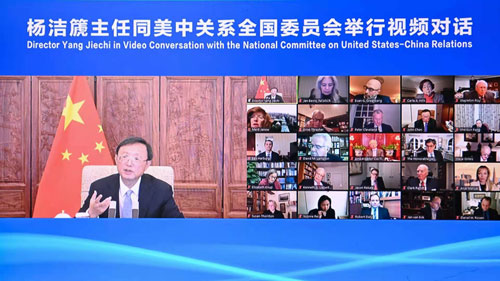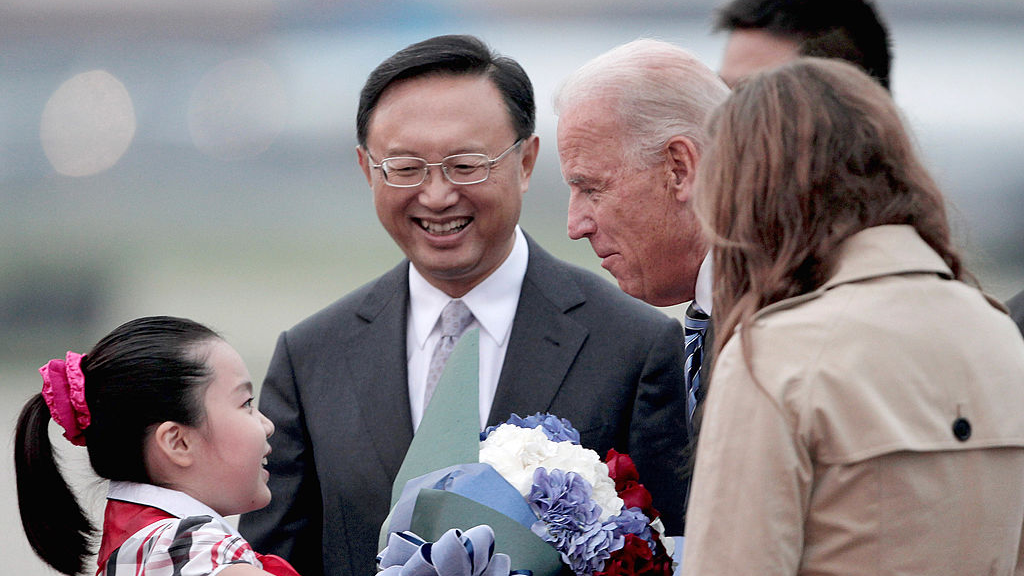
Yang Jiechi, Director of the Office of the Foreign Affairs Commission of the Communist Party of China Central Committee, is in video conversation with the National Committee on United States-China Relations. /Ministry of Foreign Affairs of the People's Republic of China
Yang Jiechi, Director of the Office of the Foreign Affairs Commission of the Communist Party of China Central Committee, is in video conversation with the National Committee on United States-China Relations. /Ministry of Foreign Affairs of the People's Republic of China
Editor's note: Thomas O. Falk is a London-based political analyst and commentator. He holds a Master of Arts in International Relations from the University of Birmingham and specializes in U.S. affairs. The article reflects the author's opinions and not necessarily the views of CGTN.
On February 2, the National Committee on U.S.-China Relations (NCUSCR) hosted a virtual dialogue with Yang Jiechi, Director of the Office of the Foreign Affairs Commission of the Communist Party of China Central Committee.
China's top diplomat is generally regarded as one of the foremost contemporary architects of the country's foreign policy. His words and his vision matter and were eagerly anticipated.
During his speech, Yang not only delivered new ideas and narratives about how to develop bilateral ties but uttered a message Washington will have heard loud and clearly: Cooperation instead of confrontation is the path forward for Sino-U.S. relations.
At a time that has been the "most difficult period since the establishment of diplomatic ties," and with the world rightfully concerned about the increased tensions, Yang reached out to Washington and offered nothing short of amicable and beneficial coexistence. He said that China calls for "a new type of international relations characterized by mutual respect, fairness, justice, and win-win cooperation, and for building a community with a shared future for mankind."
He also reiterated Beijing's stance that it has no intentions to challenge the U.S. while pledging both nations could work together on many issues such as the COVID-19 pandemic, climate change, counter-terrorism, and nuclear proliferation in a joint effort to benefit the world.
Yang also made it unequivocally apparent that China will continue to defend its own interests – just as any other nation. For cooperation to be possible, Washington needs to respect China's bottom lines and cease interfering in China's internal affairs, such as in Hong Kong Special Administrative Region or Tibet Autonomous Region.

In this file photo, Yang Jiechi (C), then Chinese Foreign Minister, meets with then U.S. Vice President Joe Biden (2nd R) and his granddaughter (1st R) Naomi Biden at the Beijing Capital International Airport in Beijing, China, August 17, 2011. /Getty
In this file photo, Yang Jiechi (C), then Chinese Foreign Minister, meets with then U.S. Vice President Joe Biden (2nd R) and his granddaughter (1st R) Naomi Biden at the Beijing Capital International Airport in Beijing, China, August 17, 2011. /Getty
Perhaps even more interesting than Yang's address will now be the White House's response. Make no mistake, Yang's words are not a geopolitical side note but potentially transcendent. For a member of the Politburo to offer prosperous coexistence while Washington has begun to revisit Reaganesque Cold War rhetoric is a dichotomy that needs to be addressed.
U.S. officials already signaled that China would be the new administration's focus in its foreign policy efforts. Following four years of turbulent policymaking under the former Donald Trump administration, Democrats and Republicans expect a more structured approach under the Biden White House.
However, at this point it is unclear whether or not Biden will embark on a more hawkish stance towards China or whether he's willing to engage in a détente former president Trump's final National Security Advisor Robert O'Brien's assessment that the Biden administration was "off to a great start on China" notwithstanding.
What is known is that Biden's National Security Adviser Jake Sullivan said on January 29 in a video posted by the State Department on Twitter that the White House would join hands with like-minded allies to form a "chorus of voices" that can push back against China. What this pushback is supposed to look like remains unknown.
In light of Yang's address, however, it might be time for the Biden White House to ignore the bipartisan stance on China and to reassess the situation.
Yang's gesture offers a paradigm shift towards a safer geopolitical world. A world in which two competitors can become friends. If Washington is inclined to reciprocate in kind, then the two sides can discuss the details, and not only détente but indeed successful and flourishing cooperation between Washington and Beijing can become the norm.
"A prospect," as Yang said, "that would benefit our two peoples and the entire world tremendously."
(If you want to contribute and have specific expertise, please contact us at opinions@cgtn.com.)

